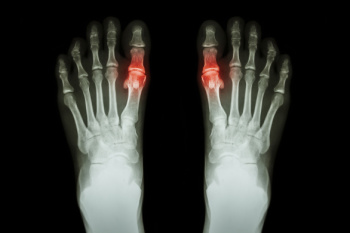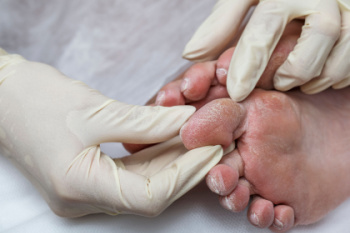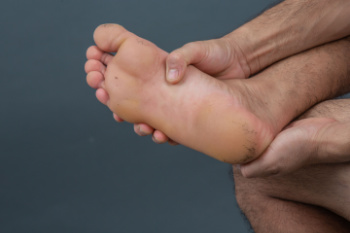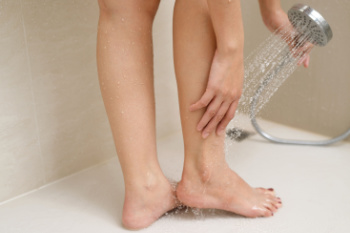October 2024
How Podiatrists Can Test for Gout

Gout is a type of arthritis that occurs when there is a buildup of uric acid in the body, leading to the formation of sharp crystals in the joints. This often results in sudden, severe pain and swelling, particularly in the big toe. When testing for gout, a podiatrist typically starts by reviewing a patient’s symptoms and history. To confirm a diagnosis, lab tests may be used, such as checking uric acid levels in the blood. A higher level of uric acid can indicate gout, but it is not always conclusive. Joint fluid analysis is a more definitive test, where fluid is taken from the affected joint and examined for uric acid crystals. Imaging tests like ultrasounds or X-rays may also be performed to detect urate crystals or rule out other conditions causing the joint pain. A podiatrist then monitors uric acid levels during treatment to ensure it is effective and adjusts the plan as needed. If you are experiencing big toe pain that may be caused by gout, it is suggested that you schedule an appointment with a podiatrist.
Gout is a painful condition that can be treated. If you are seeking treatment, contact Brian D. Jackson, DPM from Neuhaus Foot and Ankle. Our doctor will treat your foot and ankle needs.
What Is Gout?
Gout is a form of arthritis that is characterized by sudden, severe attacks of pain, redness, and tenderness in the joints. The condition usually affects the joint at the base of the big toe. A gout attack can occur at any random time, such as the middle of the night while you are asleep.
Symptoms
- Intense Joint Pain - Usually around the large joint of your big toe, and it most severe within the first four to twelve hours
- Lingering Discomfort - Joint discomfort may last from a few days to a few weeks
- Inflammation and Redness -Affected joints may become swollen, tender, warm and red
- Limited Range of Motion - May experience a decrease in joint mobility
Risk Factors
- Genetics - If family members have gout, you’re more likely to have it
- Medications - Diuretic medications can raise uric acid levels
- Gender/Age - Gout is more common in men until the age of 60. It is believed that estrogen protects women until that point
- Diet - Eating red meat and shellfish increases your risk
- Alcohol - Having more than two alcoholic drinks per day increases your risk
- Obesity - Obese people are at a higher risk for gout
Prior to visiting your podiatrist to receive treatment for gout, there are a few things you should do beforehand. If you have gout you should write down your symptoms--including when they started and how often you experience them, important medical information you may have, and any questions you may have. Writing down these three things will help your podiatrist in assessing your specific situation so that he or she may provide the best route of treatment for you.
If you have any questions, please feel free to contact one of our offices located in Columbia and Pulaski, TN . We offer the newest diagnostic and treatment technologies for all your foot care needs.
Daily Foot Care for Diabetic Feet

Daily foot care is essential for people with diabetes, as they are at higher risk for foot complications. Regularly inspecting the feet for cuts, blisters, or discoloration is essential, as even minor injuries can lead to serious infections. Keeping the feet clean and dry is important. Washing with mild soap and thoroughly drying them, especially between the toes, helps prevent fungal infections. Moisturizing the skin can combat dryness, but it is vital to avoid applying lotion between the toes to reduce the risk of moisture buildup. Wearing well-fitting, supportive shoes can help prevent friction and pressure points. Regular visits to a podiatrist for foot examinations are a good way to identify potential issues early. If you have diabetes, it is strongly suggested that you are under the care of a podiatrist who can help you to manage this condition.
Diabetic foot care is important in preventing foot ailments such as ulcers. If you are suffering from diabetes or have any other concerns about your feet, contact Brian D. Jackson, DPM from Neuhaus Foot and Ankle. Our doctor can provide the care you need to keep you pain-free and on your feet.
Diabetic Foot Care
Diabetes affects millions of people every year. The condition can damage blood vessels in many parts of the body, especially the feet. Because of this, taking care of your feet is essential if you have diabetes, and having a podiatrist help monitor your foot health is highly recommended.
The Importance of Caring for Your Feet
- Routinely inspect your feet for bruises or sores.
- Wear socks that fit your feet comfortably.
- Wear comfortable shoes that provide adequate support.
Patients with diabetes should have their doctor monitor their blood levels, as blood sugar levels play such a huge role in diabetic care. Monitoring these levels on a regular basis is highly advised.
It is always best to inform your healthcare professional of any concerns you may have regarding your feet, especially for diabetic patients. Early treatment and routine foot examinations are keys to maintaining proper health, especially because severe complications can arise if proper treatment is not applied.
If you have any questions please feel free to contact one of our offices located in Columbia and Pulaski, TN . We offer the newest diagnostic and treatment technologies for all your foot and ankle needs.
Facts About Cracked Heels

Cracked heels, also known as heel fissures, occur when the skin on the heels becomes dry and thickened, leading to painful splits. Several factors contribute to this condition. Excess weight can put additional pressure on the heels, promoting dryness and leading to cracks. Reduced skin elasticity, often due to aging or lack of moisture, makes the skin less resilient. Wearing inappropriate shoes, such as those lacking adequate support or cushioning, can worsen the problem by failing to protect the heels. Prolonged standing or walking on hard surfaces can also increase the risk of cracked heels, as this puts strain on the skin. Additionally, genetics may play a role in an individual's susceptibility to this condition. Cracked heels can be painful and may cause difficulty in completing daily activities. If you have developed cracked heels, it is strongly suggested that you consult a podiatrist who can successfully treat this problem, which may include prescribed medication.
Cracked heels are unsightly and can cause further damage to your shoes and feet. If you have any concerns, contact Brian D. Jackson, DPM from Neuhaus Foot and Ankle. Our doctor can provide the care you need to keep you pain-free and on your feet.
Cracked Heels
Cracked heels appear unappealing and can make it harder for you walk around in sandals. Aside from looking unpleasant, cracked heels can also tear stockings, socks, and wear out your shoes. There are several methods to help restore a cracked heel and prevent further damage.
How Do You Get Them?
Dry skin is the number one culprit in creating cracked heels. Many athletes, walkers, joggers, and even swimmers suffer from cracked heels. Age and skin oil production play a role to getting cracked heels as well.
Promote Healing
Over the counter medicines can help, especially for those that need instant relief or who suffer from chronic dry feet.
Wear Socks – Wearing socks with medicated creams helps lock in moisture.
Moisturizers – Applying both day and night will help alleviate dryness which causes cracking.
Pumice Stones – These exfoliate and remove dead skin, which allows for smoother moisturizer application and better absorption into the skin.
Change in Diet
Eating healthy with a well-balanced diet will give the skin a fresh and radiant look. Your body responds to the kinds of food you ingest. Omega-3 fatty acids and zinc supplements can also revitalize skin tissue.
Most importantly, seek professional help if unsure how to proceed in treating cracked heels. A podiatrist will help you with any questions or information needed.
If you have any questions, please feel free to contact one of our offices located in Columbia and Pulaski, TN . We offer the newest diagnostic and treatment technologies for all your foot care needs.
Caring for Your Feet

Caring for your feet is important to your overall wellness for several reasons. First, healthy feet support movement and balance, allowing you to stay active. Poor foot health can lead to pain and reduced mobility, which can affect your daily activities. Additionally, feet play a key role in maintaining proper posture. Issues like flat feet or bunions can cause misalignment and strain on your joints and muscles. Good foot care also promotes better circulation, ensuring that blood flow is optimal, which is vital for your overall health. Regular attention to your feet can help prevent common problems like calluses, corns, and fungal infections, reducing discomfort and potential complications. Moreover, feet can serve as indicators of other health issues, such as diabetes or heart conditions, so monitoring their health can help detect problems early. If you have foot problems or wish to enhance your foot care regimen, it is suggested that you schedule an appointment with a podiatrist.
Everyday foot care is very important to prevent infection and other foot ailments. If you need your feet checked, contact Brian D. Jackson, DPM from Neuhaus Foot and Ankle. Our doctor can provide the care you need to keep you pain-free and on your feet.
Everyday Foot Care
Often, people take care of their bodies, face and hair more so than they do for their feet. But the feet are a very important aspect of our bodies, and one that we should pay more attention to. Without our feet, we would not be able to perform most daily tasks.
It is best to check your feet regularly to make sure there are no new bruises or cuts that you may not have noticed before. For dry feet, moisturizer can easily be a remedy and can be applied as often as necessary to the affected areas. Wearing shoes that fit well can also help you maintain good foot health, as well as making it easier to walk and do daily activities without the stress or pain of ill-fitting shoes, high heels, or even flip flops. Wearing clean socks with closed shoes is important to ensure that sweat and bacteria do not accumulate within the shoe. Clean socks help to prevent Athlete’s foot, fungi problems, bad odors, and can absorb sweat.
If you have any questions please feel free to contact one of our offices located in Columbia and Pulaski, TN . We offer the newest diagnostic and treatment technologies for all your foot and ankle needs.
Arthritis Can Cause Pain in the Feet and Ankles
Treatment of Acute Ankle Injuries

Acute ankle injuries are common and can involve sprains, fractures, or soft tissue damage. Clinical guidelines podiatrists use help determine whether an X-ray is needed, based on specific criteria, such as pain in certain bone areas and difficulty bearing weight. A physical exam can assess soft tissue damage, differentiating stable from unstable injuries. Stable injuries involve intact ligaments and bones, allowing conservative treatment like rest and compression. Unstable injuries, often involving complete ligament tears, may require immobilization or more aggressive treatment. If symptoms persist, an MRI can reveal deeper issues, such as syndesmosis injury, where the ligaments between the tibia and fibula are damaged. This often requires a longer recovery. Surgery is typically reserved for chronic instability or severe injuries. If you have injured your ankle, it is suggested that you schedule an appointment with a podiatrist for a proper diagnosis and appropriate treatment.
Foot and ankle trauma is common among athletes and the elderly. If you have concerns that you may have experienced trauma to the foot and ankle, consult with Brian D. Jackson, DPM from Neuhaus Foot and Ankle. Our doctor will assess your condition and provide you with quality foot and ankle treatment.
Foot and ankle trauma cover a range of injuries all over the foot; common injuries include:
- Broken bones
- Muscle strains
- Injuries to the tendons and ligaments
- Stress fractures
Symptoms
Symptoms of foot and ankle injuries vary depending on the injury, but more common ones include:
- Bruising
- Inflammation/ Swelling
- Pain
Diagnosis
To properly diagnose the exact type of injury, podiatrists will conduct a number of different tests. Some of these include sensation and visual tests, X-rays, and MRIs. Medical and family histories will also be taken into account.
Treatment
Once the injury has been diagnosed, the podiatrist can than offer the best treatment options for you. In less severe cases, rest and keeping pressure off the foot may be all that’s necessary. Orthotics, such as a specially made shoes, or immobilization devices, like splints or casts, may be deemed necessary. Finally, if the injury is severe enough, surgery may be necessary.
If you have any questions, please feel free to contact one of our offices located in Columbia and Pulaski, TN . We offer the newest diagnostic and treatment technologies for all your foot care needs.








